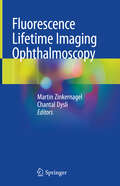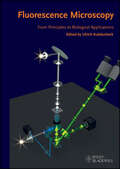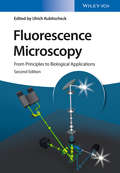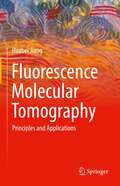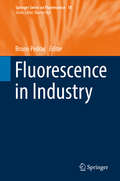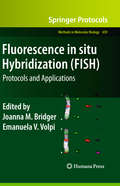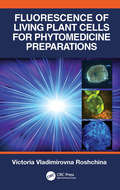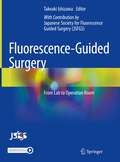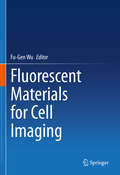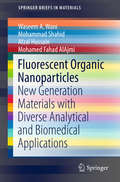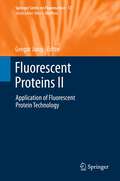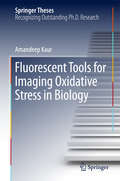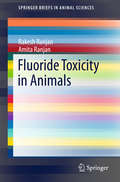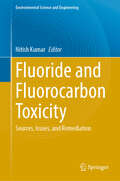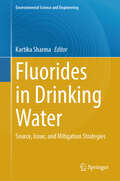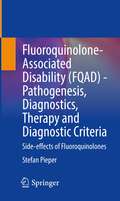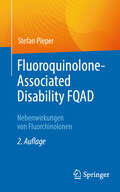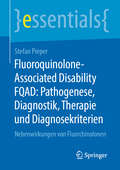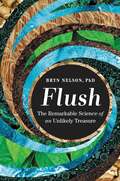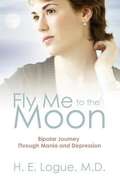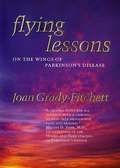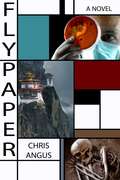- Table View
- List View
Fluorescence Lifetime Imaging Ophthalmoscopy
by Martin Zinkernagel Chantal DysliThis book focuses on the emerging non-invasive imaging technique of Fluorescence Lifetime Imaging Ophthalmoscopy (FLIO). FLIO reveals unique information on retinal diseases, ranging from age-related macular degeneration and vascular diseases to hereditary retinal dystrophies. Fluorescence lifetimes enable the evaluation of disease progression before irreversible structural changes occur. The image acquisition is suitable for diagnostic purposes and follow-up examinations to investigate the natural course of disease, and to monitor the effects of possible therapies. This book fills the gap between available literature and gives state-of-the-art guidance on the principles of the FLIO technique, image acquisition, and data analysis. Written by a team of expert leaders within this field, this book will be relevant for scientists and clinicians with an interest in ophthalmoscopy.
Fluorescence Lifetime Spectroscopy and Imaging: Principles and Applications in Biomedical Diagnostics
by Laura Marcu Paul M. W. French Daniel S. ElsonDuring the past two decades, there has been an increasing appreciation of the significant value that lifetime-based techniques can add to biomedical studies and applications of fluorescence. Bringing together perspectives of different research communities, Fluorescence Lifetime Spectroscopy and Imaging: Principles and Applications in Biomedical Dia
Fluorescence Microscopy
by Ulrich KubitscheckA comprehensive introduction to advanced fluorescence microscopy methods and their applications.This is the first title on the topic designed specifically to allow students and researcherswith little background in physics to understand both microscopy basics and novel light microscopy techniques. The book is written by renowned experts and pioneersin the field with a rather intuitive than formal approach. It always keeps the nonexpert reader in mind, making even unavoidable complex theoretical concepts readily accessible. All commonly used methods are covered.A companion website with additional references, examples and video material makesthis a valuable teaching resource:http://www.wiley-vch.de/home/fluorescence_microscopy/
Fluorescence Microscopy: From Principles to Biological Applications
by Ulrich KubitscheckWhile there are many publications on the topic written by experts for experts, this text is specifically designed to allow advanced students and researchers with no background in physics to comprehend novel fluorescence microscopy techniques. This second edition features new chapters and a subsequent focus on super-resolution and single-molecule microscopy as well as an expanded introduction. Each chapter is written by a renowned expert in the field, and has been thoroughly revised to reflect the developments in recent years.
Fluorescence Microscopy: From Principles to Biological Applications
by Ulrich KubitscheckA comprehensive introduction to advanced fluorescence microscopy methods and their applications. This is the first title on the topic designed specifically to allow students and researchers with little background in physics to understand both microscopy basics and novel light microscopy techniques. The book is written by renowned experts and pioneers in the field with a rather intuitive than formal approach. It always keeps the nonexpert reader in mind, making even unavoidable complex theoretical concepts readily accessible. All commonly used methods are covered. A companion website with additional references, examples and video material makes this a valuable teaching resource: http://www.wiley-vch.de/home/fluorescence_microscopy/
Fluorescence Molecular Tomography: Principles and Applications
by Huabei JiangFluorescence Molecular Tomography: Principles and Applications is the first book to cover the underlying principles and practical applications of fluorescence molecular tomography (FMT) in a systematic manner. Using a tutorial approach, the text begins with an overview of the fundamentals of FMT and goes on to detail image reconstruction approaches (including linear and nonlinear reconstruction algorithms), FMT instrumentations (including time-domain, frequency-domain, and continuous-wave domain systems), and implementation of image-enhancing schemes (including both software and hardware approaches). Further chapters examine multimodal approaches combining photoacoustic tomography (PAT), computed tomography (CT), single-photon emission tomography (SPECT), and magnetic resonance imaging (MRI) and discuss bioluminescence tomography and miniaturized FMT from hand-held to endoscopic FMT. A final chapter looks at clinical applications and animal studies. This authoritative and practical guide will serve as a valuable reference for researchers, scientists, clinicians, and industry professionals.The first book dedicated to fluorescence molecular tomography (FMT); Covers underlying principles and practical applications; Written by a leading FMT research pioneer and expert.
Fluorescence Sensors and Biosensors
by Richard B. ThompsonFluorescence-based sensing is a significant technique used in prominent fields such as fluorescence-activated cell sorting, DNA sequencing, high-throughput screening, and clinical diagnostics. Fluorescence Sensors and Biosensors emphasizes the most recent developments and emerging technologies with the broadest impacts.The text begins wi
Fluorescence in Industry (Springer Series on Fluorescence #18)
by Bruno PedrasThis book gathers 12 outstanding contributions that reflect state-of-the-art industrial applications of fluorescence, ranging from the pharmaceutical and cosmetics industries to explosives detection, aeronautics, instrumentation development, lighting, photovoltaics, water treatment and much more. In the field of fluorescence, the translation of research into important applications has expanded significantly over the past few decades. The 18th volume in the Springer Series on Fluorescence fills an important gap by focusing on selected industrial applications of fluorescence, described in contributions by both industry-based researchers and academics engaged in collaborations with industrial partners.
Fluorescence in situ Hybridization (FISH)
by Keith Morris Joanna M. BridgerThe design simplicity and cost-effectiveness of the early Fluorescence in situ Hybridization (FISH) protocols, combined with the significant acceleration of discoveries in related technical areas like fluorescence microscopy, digital imaging, and nucleic acid technology have prompted the diversification of the original technique into an outstanding number of imaginative and useful applications, thus promoting its expansion into different areas of basic and applied research in the post-genomic era. In Fluorescence in situ Hybridization (FISH): Protocols and Applications, experts in the field portray the vibrant complexity and diversity of the current FISH protocol landscape, providing cutting-edge examples of various applications for genetic and developmental research, cancer research, reproductive medicine, diagnostic and prognostic purposes, microbial ecology and evolutionary studies. The book is divided into four convenient sections covering the core techniques, technical advancements and novel adaptations, applications for human genetics and medicine, as well as protocols for model organisms. Written in the highly successful Methods in Molecular BiologyTM series format, chapters include introductions to their respective chapters, lists of the necessary materials and reagents, step-by-step, readily reproducible laboratory protocols, and notes highlighting tips on troubleshooting and avoiding known pitfalls. Comprehensive and up-to-date, Fluorescence in situ Hybridization (FISH): Protocols and Applications aims to aid scientists from across the world in applying this tried-and-true scientific technique to their own lab's current research.
Fluorescence of Living Plant Cells for Phytomedicine Preparations
by Victoria Vladimirovna RoshchinaFluorescence of Living Plant Cells for Phytomedicine Preparations reveals how valuable medicinal compounds can be identified through the application of vital fluorescence in plant cells. The book explains the roles that fluorescent compounds play in plant physiology and promotes our knowledge of plant secretory cells and phytopreparations. Supported by vivid illustrations, the book reveals how actinic light – light that induces fluorescence in leaves and flowers – can be used in the identification of secretory cells within plant tissue that may be the repository of valuable medicinal compounds. The book demonstrates the potential of fluorescence in pharmacological analysis with detailed methods for applying fluorescence to identify these deposits of natural drugs. As such, this groundbreaking book contains methods of express-pharmaceutical analysis that could open new horizons in pharmacy and the cultivation of medicinal plants. Features Describes various fluorescence microscopy techniques for the localization of compounds contained in plants with pharmaceutical interest Provides an analysis of pharmaceutical material based on autofluorescence and histochemical reactions for numerous medicinal plant species Demonstrates practices for providing optimal growing conditions and improving the quality of the compounds Showing the readiness of plant raw material for pharmaceutical industry, this book will appeal to professionals in the pharmaceutical industry and students and researchers in the fields of phytochemistry, botany and pharmaceutical sciences.
Fluorescence-Guided Surgery: From Lab to Operation Room
by JsfgsThis volume is a practical guide of theranostics using intraoperative fluorescence imaging technology, as an all-out effort by the Japanese Society for Fluorescence Guided Surgery. It describes the various approaches the technique is being used such as vascular imaging, identification of lymphatic vessels by intratissue injection, lymph node imaging, and imaging for identification of anatomical structures. The book is organized into three major parts and the first one delivers the basics, introducing the use of the technology in clinical settings and initial setups. Next comes the description of clinical applications where chapters illustrate perfusion assessment, cancer localization, anatomy visualization, and lymph nodes/ducts mapping. Each chapter is devoted to the specific surgical field and disease areas, presenting images and videos of case studies. The last part presents some upcoming techniques for treatments. The Editor and the authors wish the ideas presented here will be hints to bridge the knowledge between surgeons and basic researchers for further innovation and practicality. It is important to stay up-to-date since intraoperative fluorescence imaging has been applied to clinical settings in various surgical fields and at the same time, novel techniques improving the efficacy of the technology have also been developed actively. Fluorescence-Guided Surgery – From Lab to Operation Room is recommended for surgeons, operating nurses, medical experts, basic researchers and, industry engineers worldwide beyond boundaries of specialties. Edited and written by experts of The Japanese Society for Fluorescence-Guided Surgery, those who are the founders of the technology, it describes the accurate development history and cutting-edge techniques based on the knowledge accumulated over the years.
Fluorescent Materials for Cell Imaging
by Fu-Gen WuThis book focuses on the latest fluorescent materials for cell imaging. Cell imaging is a widely used basic technique that helps scientists gain a better understanding of biological functions through studies of cellular structure and dynamics. In the past decades, the development of a variety of new fluorescent materials has significantly extended the applications of cellular imaging techniques. This book presents recently developed fluorescent materials, including semiconductor quantum dots, carbon dots, silicon nanoparticles, metal nanoclusters, upconversion nanoparticles, conjugated polymers/polymer dots, aggregation-induced emission (AIE) probes, and coordination compounds, used for various cellular imaging purposes. It will appeal to cell biologists and other researchers in academia, industry and clinical settings who are interested in the technical development and advanced applications of fluorescence imaging in cells, tissues and organisms to explore the mechanisms of biological functions and diseases.
Fluorescent Organic Nanoparticles: New Generation Materials with Diverse Analytical and Biomedical Applications (SpringerBriefs in Materials)
by Waseem A. Wani Mohammad Shahid Afzal Hussain Mohamed Fahad AlAjmiThis book provides a critical review of recent advances in the development of fluorescent organic nanoparticles as materials of choice for the design and fabrication of sensors, bioimaging agents and drug delivery systems. The properties and functions of nanoparticles differ significantly from those of their parent entities or their bulk phases. Two of their most important features are their increased surface-to volume ratio, and the formation of surface structures differing from those in their bulk phases. In addition, the book discusses the synthesis of fluorescent conjugated polymers, self-assembled fluorescent nanoparticles, polydopamine nanoparticles, and aggregation-induced-emission or aggregation-induced-emission enhancement nanomaterials. In closing, the book provides an outlook on future research and development in fluorescent organic nanoparticles as smart materials with an impressive range of potential applications.
Fluorescent Proteins I
by Gregor JungFluorescent proteins are intimately connected to research in the life sciences. Tagging of gene products with fluorescent proteins has revolutionized all areas of biosciences, ranging from fundamental biochemistry to clinical oncology, to environmental research. The discovery of the Green Fluorescent Protein, its first, seminal application and the ingenious development of a broad palette of fluorescence proteins of other colours, was consequently recognised with the Nobel Prize for Chemistry in 2008. Fluorescent Proteins I is devoted to the basic photophysical and photochemical aspects of fluorescent protein technology. Experienced experts highlight colour tuning, the exploration of switching phenomena and respective methods for their investigation. The book provides a thorough understanding of primary molecular processes allowing the design of fluorescent proteins for specific applications.
Fluorescent Tools for Imaging Oxidative Stress in Biology (Springer Theses)
by Amandeep KaurThis thesis advances the long-standing challenge of measuring oxidative stress and deciphering its underlying mechanisms, and also outlines the advantages and limitations of existing design strategies. It presents a range of approaches for the chemical synthesis of fluorescent probes that detect reversible changes in cellular oxidative stress. The ability to visualise cellular processes in real-time is crucial to understanding disease development and streamline treatment, and this can be achieved using fluorescent tools that can sense reversible disturbances in cellular environments during pathogenesis. The perturbations in cellular redox state are of particular current interest in medical research, since oxidative stress is implicated in the pathogenesis of a number of diseases.The book investigates different strategies used to achieve ratiometric fluorescence output of the reversible redox probes, which nullify concentration effects associated with intensity-based probes. It also describes suitable approaches to target these probes to specific cellular organelles, thereby enabling medical researchers to visualise sub-cellular oxidative stress levels, and addressing the typically poor uptake of chemical tools into biological studies. In total it reports on four new probes that are now being used by over twenty research groups around the globe, and two of which have been commercialised. The final chapters of this thesis demonstrate successful applications of the sensors in a variety of biological systems ranging from prokaryotes to mammalian cells and whole organisms. The results described clearly indicate the immense value of collaborative, cross-disciplinary research.
Fluoride Toxicity in Animals
by Rakesh Ranjan Amita RanjanThis book describes in detail various aspects of fluoride toxicity in animals. Animals, like human beings, suffer from the toxic effects of excess fluoride intake. They show pathological changes in their teeth and bone, together with a marked reduction in appetite, productive and reproductive potentials, which can result in severe economic losses in the dairy industry. Laboratory and wild animals also suffer from this ailment. Animal suffering and economic losses alike can be minimized through early diagnosis of the problem and by adopting suitable preventive and therapeutic measures. The book details the susceptibility of different animal species, important sources of toxicity, clinical signs and symptoms, pathophysiology, diagnostic methods, preventive and therapeutic approaches. It offers a valuable resource for scientists working in the fields of toxicology, veterinary science, animal nutrition, and environmental science, as well as for public health workers, animal welfare activists, public health veterinarians, field veterinarians, medical professionals and all others interested in the subject.
Fluoride and Fluorocarbon Toxicity: Sources, Issues, and Remediation (Environmental Science and Engineering)
by Nitish KumarThis book presents fluoride and fluorocarbon toxicity with respect to remediation and health issues. It covers sources of fluoride and fluorocarbon contamination, its impact on human health, and prospective remediation by multi-disciplinary approaches with the application of recent advanced technology. This book brings together a diverse group of researchers from different disciplines to address the challenges posed by global mass poisoning caused by fluoride and fluorocarbon contamination. The book sheds light on the global environmental issues and proposes solutions to contamination through multi-disciplinary approaches. The book contains three parts. The first part describes the different sources and distribution of fluoride and fluorocarbon in soil and water. The second part explains the health risks linked to fluoride and fluorocarbon toxicity. The third part addresses sustainable fluoride and fluorocarbon toxicity mitigation strategies and the potential applications of recent biotechnology in providing solutions. This book is a valuable resource to students, academics, researchers, and environmental professionals working in the field of fluoride and fluorocarbon contamination.
Fluorides in Drinking Water: Source, Issue, and Mitigation Strategies (Environmental Science and Engineering)
by Kartika SharmaThis book brings together a diverse group of researchers to address the challenges posed by global mass poisoning caused by fluoride contamination of water bodies. The book sheds light on this global environmental issue and proposes solutions to contamination through multi-disciplinary approaches. Water is considered a vital resource because it is necessary for all aspects of human and ecosystem survival. However, due to natural processes and anthropogenic activities, various pollutants have been added to the water system. Among these, fluoride and fluorocarbons (fluorinated carbon) are some of the most serious pollutants. It occurs naturally in several minerals and in trace quantities in water. Due to its characteristics, it is very widely used in medicine, dentistry, industry, or agriculture. Fluoride content in drinking water is very important from health point of view as because it has long been recognized as a constituents of bones, teeth, soft tissues, and body fluids. On the other hand, its universality possesses a real threat to the human body in the form of acute and chronic poisoning. There are reports that excessive fluoride intake for extended period causes adverse effects of health such as fluorosis, cancer, arthritis, and other diseases. It has also been observed that fluoride in excess affects human intelligence, especially in children, who are most susceptible to early fluoride toxicity. This book contains three sections. The first section describes the different sources and distribution of fluoride in water ecosystem. The second section explains the health risks linked to fluoride poisoning. The third section addresses sustainable fluoride toxicity mitigation strategies and the potential applications of recent biological technology in providing solutions. This book is a valuable resource to students, academics, researchers, and environmental professionals doing fieldwork on fluoride and fluorocarbons contamination throughout the world.
Fluoroquinolone-Associated Disability (FQAD) - Pathogenesis, Diagnostics, Therapy and Diagnostic Criteria: Side-effects of Fluoroquinolones
by Stefan PieperIn this book, Stefan Pieper supports doctors and therapists in easily diagnosing FQAD and in better and more adequately dealing with FQAD patients. Fluoroquinolones, as one of the most common and effective groups of antibiotics, are known to have a distinct spectrum of side effects. These adverse effects are rare in percentage terms, but frequent in absolute numbers due to the enormous quantities of prescriptions. Because they are usually quite severe and wide-ranging, they tend to run like a syndrome and have been classified by the FDA as a separate condition, the FQAD, because of their frequency, severity and risk of disability.This book presents for the first time a comprehensive description and classification of the clinical picture and a proposal for a clinical diagnostic tool based on diagnostic criteria.
Fluoroquinolone-Associated Disability FQAD: Nebenwirkungen von Fluorchinolonen
by Stefan PieperDieses Buch hilft das Krankheitsbild FQAD einfach zu diagnostizieren und mit FQAD-Patienten besser und adäquater umzugehen: Ein Muss für Ärztinnen und Ärzte der Allgemeinmedizin, Orthopädie, Neurologie und Psychiatrie sowie Therapieberufe. Im Mittelpunkt stehen Pathogenese, Diagnostik und die (begrenzten) therapeutischen Möglichkeiten, die aus der Sicht des Autors Aussicht auf Erfolg haben. FAQD-Diagnosekriterien helfen zudem, das neue Krankheitsbild im Praxisalltag sicher und zeitsparend einzugrenzen. Individuelle Praxiserfahrungen des Autors mit inzwischen mehr als 1000 FQAD-Patienten ergänzen das Praxisbuch
Fluoroquinolone-Associated Disability FQAD: Nebenwirkungen von Fluorchinolonen (essentials)
by Stefan PieperDer Begriff „Fluoroquinolone-Associated Disability“ (FQAD) ist spätestens seit der Verwendung durch die US Food and Drug Administration (FDA) etabliert – allerdings ist die Definition der FDA mit den dazugehörenden Diagnosekriterien für den behandelnden Arzt nicht alltagstauglich. Stefan Pieper unterstützt in diesem essential Ärzte und Therapeuten, FQAD einfach zu diagnostizieren und mit FQAD-Patienten besser und adäquater umzugehen. Besonderes Augenmerk legt der Autor auf die Pathogenese, Diagnostik und die (begrenzten) therapeutischen Möglichkeiten, die aus seiner Sicht Aussicht auf Erfolg haben. Zudem schlägt er für die FQAD Diagnosekriterien vor, die eine möglichst sichere und dabei zeitsparende Eingrenzung des neuen Krankheitsbildes erreichen, um diese im Praxisalltag zu implementieren. Praxiserfahrungen des Autors mit inzwischen mehr als 250 FQAD-Patienten ergänzen das essential.
Flush: The Remarkable Science of an Unlikely Treasure
by Bryn NelsonFor readers of Giulia Enders&’ Gut and Bill Bryson&’s The Body, a surprising, witty and sparkling exploration of the teeming microbiome of possibility in human feces from microbiologist and science journalist Bryn Nelson.The future is sh*t: the literal kind. For most of human history we&’ve been, well, disinclined to take a closer look at our body&’s natural product—the complex antihero of this story—save for gleaning some prophecy of our own health. But if we were to take more than a passing look at our poop, we would spy a veritable cornucopia of possibilities. We would see potent medicine, sustainable power, and natural fertilizer to restore the world&’s depleted lands. We would spy a time capsule of evidence for understanding past lives and murderous ends. We would glimpse effective ways of measuring and improving human health from the cradle to the grave, early warnings of community outbreaks like Covid-19, and new means of identifying environmental harm—and then reversing it.Flush is both an urgent exploration of the world&’s single most squandered natural resource, and a cri de coeur (or cri de colon?) for the vast, hidden value in our &“waste.&” Award-winning journalist and microbiologist Bryn Nelson, PhD, leads readers through the colon and beyond with infectious enthusiasm, helping to usher in a necessary mental shift that could restore our balance with the rest of the planet and save us from ourselves. Unlocking poop&’s enormous potential will require us to overcome our shame and disgust and embrace our role as the producers and architects of a more circular economy in which lowly byproducts become our species&’ salvation. Locked within you is a medicine cabinet, a biogas pipeline, a glass of drinking water, a mound of fuel briquettes; it&’s time to open the doors (carefully!). A dose of medicine, a glass of water, a gallon of rocket fuel, an acre of soil: sometimes hope arrives in surprising packages.
Fly Me To The Moon: Bipolar Journey Through Mania And Depression
by H. E. LogueThis novel gets you inside Eileen's mind, buckles you in for her adventurous journey of highs, lows, romance, intrigue, betrayal and triumph. <P><P>Effortlessly, the reader absorbs a deep understanding of Bipolar Disorder, those with it and those who must deal with it. <P><P>The novel is so informative that it provides medical doctors with educational credit.
Flying Lessons: On the Wings of Parkinson's Disease
by Joan Grady-FitchettThe book is about a woman, Grady-Fitchett, who is suffering from Parkinson's disease and fighting against it. Her passion to be independent has been clearly described in this book.
Flypaper: A Novel
by Chris AngusHow do you fight a deadly disease that comes from beyond planet Earth?When a 2,000-year-old mummy is unearthed in central China, investigators from all over the world fly in to Washington, DC, for a top secret meeting, hoping to find an answer to its mysterious genetic anomalies.But the scientists may have mistakenly released a new, deadly disease of extraterrestrial origins in the process of examining the genetic markers of the ancient mummy. The devastating human error causes a worldwide plague-one that penetrates the barriers of the human immune system. Sino expert Eric Logan and archaeologist Dr. Marcia Kessler lead an expedition back to the icy glaciers of China to extract a much older 20,000-year-old mummy, which could help them formulate a cure. Even as they embark on their mission, the strange illness afflicts the people around them, turning men into mindless monsters.The team retreats to a remote Buddhist monastery and must hold off a vicious army of victims. As they wrestle with the possibility that they may be the last living humans on earth, someone finds an ancient burial object that may hold the key to ending the apocalyptic epidemic . . .
